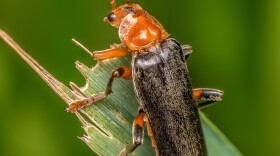Insects play critical roles in our world. Pollination is one of them.
Pollination is a game of give and take …insects visiting flowers for the reward of nectar and plants using insects to transport pollen for fertilization. They both benefit from the interaction.
But that’s not always the case. Take Hammer Orchids for instance …a genus of plant that’s evolved with basically one species of thynnid wasp as it’s pollinator. What does the wasp get in return? Embarassingly fooled time and time again.
Female thynnid wasps are flightless and spend much of their time underground. When ready to mate, they climb a blade of grass and release a pheromone to attract the boys. With their irresistible scent on the wind, it’s not long before a suitor (or multiple suitors) show up.
To avoid competition from other admirers, a male will swoop in, grasp the female, and fly off with her …mating while in flight.
Hammer Orchids have evolved to take advantage of the males’ rush to capture and fly off with a mate.
First, the orchid’s central petal visually resembles a female thynnid wasp. But the icing on the cake is the fact that the orchid also releases a chemical copy of the female wasp’s pheromones. The combination of the visual and scent cues works like a charm.
Duped by the flower’s trickery, a male wasp will swoop in, grasp the orchid’s petal, and try to fly away. After making a number of attempts to fly off with his uncooperative mate, he will eventually give up after becoming covered in pollen in the process.
But soon enough, he falls for the same deception …this time delivering pollen to a different plant.
Deception? Maybe. But pollination success.





